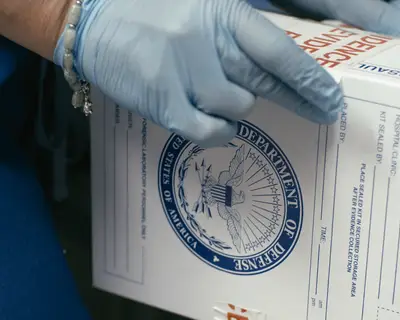RESEARCH TRIANGLE PARK, NC– Sexual assault kits that may contain evidence for criminal investigations and prosecutions must be submitted to crime laboratories to begin the process of seeking justice for victims of sexual assault. A significant number of unsubmitted sexual assault kits remain in law enforcement property rooms across the U.S., leaving victims in fear and hindering efforts to take violent offenders off the streets. Now, the significant task of identifying and processing these thousands of kits and investigating and prosecuting these cases, while promoting survivor healing, has become less daunting for law enforcement professionals, agencies and communities. With the launch of a new Sexual Assault Kit Initiative (SAKI) Online Toolkit and training site, the SAKI Virtual Academy, these free, easily downloadable tools supply much needed resources to the nation’s law enforcement agencies and prosecutors to help investigators, prosecutors and victim advocates close out cases and bring answers to survivors.
The tools were developed by policing research and forensic science experts at RTI International, a leading non-profit research institute, and a team of multidisciplinary consultants with experience in sexual assault investigations and funded by the U.S. Department of Justice’s Bureau of Justice Assistance (BJA).
“RTI is proud to assist law enforcement professionals in the submission and processing of unsubmitted sexual assault kits in crime laboratories and law enforcement agencies throughout the United States,” said Kevin Strom, director of RTI’s Policing Research Program. “These online tools and trainings will help reduce the large backlog of untested sexual assault kits and potentially enable closure for victims.”
The U.S. Department of Justice’s Bureau of Justice Assistance (BJA) National Sexual Assault Kit Initiative (SAKI) aims to create a coordinated community response that ensures just resolution to sexual assault cases. Through the SAKI program, funding is provided to support multidisciplinary community response teams engaged in the comprehensive reform of jurisdictions’ approaches to sexual assault cases resulting from evidence found in previously unsubmitted sexual assault kits. Whether or not a jurisdiction is funded by SAKI, the Online Toolkit and Virtual Academy aim to meet the large need for more sexual assault training across the country.
The SAKI Toolkit can be downloaded as “pre-packaged briefcases” or customized to the needs of law enforcement, prosecutors, victim advocates, or other criminal justice professionals and shared with others. Pre-packaged resource sets are available according the role that the users may play on a sexual assault response team. Examples include briefcases for multidisciplinary team leaders, sexual assault investigators, and sexual assault prosecutors.
The SAKI Virtual Academy is the home of online training and resources to help law enforcement and communities improve their jurisdiction’s capacity to investigate, prosecute, inventory, and track SAKs, and provide trauma-informed victim services and advocacy. Several web-based courses are available including Developing a SAK Testing Plan; Working the Case 1: Case Assessment and Review; and Developing a Victim Notification Protocol. Additional courses are planned and coming soon on Case Follow Up and Prosecuting Cold Case Sexual Assaults.
“The SAKI Toolkit and Virtual Academy are essential resources for prosecutors, victim advocates, law enforcement, and other key stakeholders,” said Rebecca Campbell, PhD, professor of psychology at Michigan State University. “These tools can help multi-disciplinary teams inventory and track sexual assault kits, investigate and prosecute sexual assaults, and provide trauma-informed services to sexual assault survivors.”

- A significant number of unsubmitted sexual assault kits remain in law enforcement property rooms across the U.S., leaving victims in fear and hindering efforts to take violent offenders off the streets
- With the launch of a new Sexual Assault Kit Initiative (SAKI) Online Toolkit and training site, the SAKI Virtual Academy, these free, easily downloadable tools supply much needed resources to the nation’s law enforcement agencies and prosecutors to help investigators, prosecutors and victim advocates close out cases and bring answers to survivors
- The tools were developed by policing research and forensic science experts at RTI International and a team of multidisciplinary consultants with experience in sexual assault investigations and funded by the U.S. Department of Justice’s Bureau of Justice Assistance
RTI International Media Relations:
As an independent, scientific research institute with a mission to improve the human condition, RTI International is engaged by clients and partners to conduct evidence-based research and project implementation. We share our work in line with journalistic and scientific standards and maintain a record in RTI’s Newsroom.
RTI International is an independent scientific research institute dedicated to improving the human condition. Our vision is to address the world's most critical problems with technical and science-based solutions in pursuit of a better future. Clients rely on us to answer questions that demand an objective and multidisciplinary approach—one that integrates expertise across social, statistical, data, and laboratory sciences, engineering, and other technical disciplines to solve the world’s most challenging problems.
For more information, visit www.rti.org.

